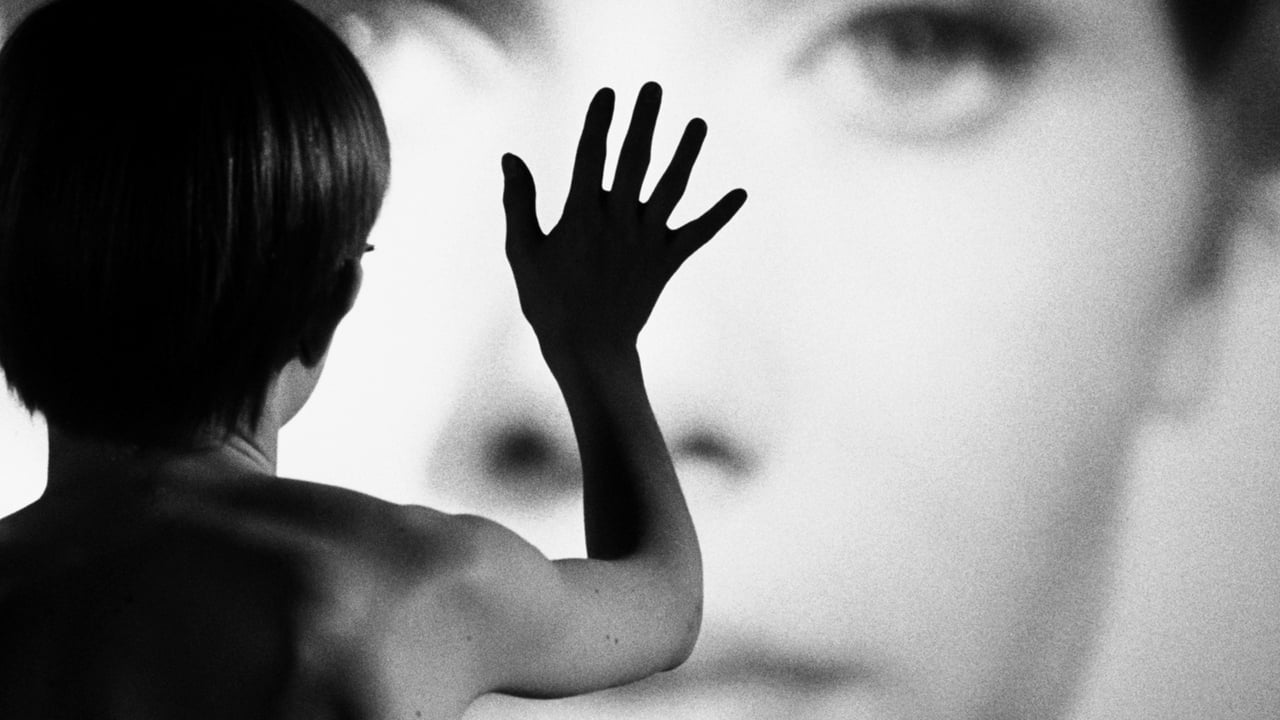

The movie opens with a series of unconnected and somewhat disturbing images - the shearing of a sheep, a nail pounded into a victim's hand a la the crucifixion, dead people on slabs in a mortuary. Quick edits over the opening credits additionally lend a surreal flavor to the picture, so that we have no idea what's coming. If one were to view the opening montage once again after the picture concludes, one might be willing to connect the teenage boy to Elisabet Vogler (Liv Ullman) as the son she bore who she wants no part of. One will have to decide.It seems to me this is the kind of film that's open to one's interpretation in the most personal of ways. Having read a few of the reviews for this movie, there are multiple thoughts on the film that appear just as valid as mine might be, some that even contradict each other. For this viewer, the dynamic between Elisabet and Sister Alma (Bibi Andersson) forces the caretaker to confront her own insecurities about life. In Elisabet, Alma foresees for herself a failed marriage, children she doesn't want, and abandoning a job that she likes for the sole reason of fitting into a society that expects those things from a woman.It's interesting how Ingmar Bergman's direction offers ambiguity in various scenes. When Lisabet tears up the picture of her son, does Alma witness that or not? When Mr. Vogler arrives he speaks to Alma as if she were his wife, leaving her in a state of confusion. However one of the principal ideas coming out of the film, that the personas of Lisabet and Alma are somehow merging together is one that never crossed my mind, even with the camera tricks of melding the two faces together. As I say, one will have their own thoughts and ideas about what occurs in the story, and who's to say that any one or another is valid or invalid? It's all open to interpretation.What elevates the picture to the rank of pure cinema can be found in it's artistic style and bold cinematography. Notwithstanding the early garish images, the film remains austere throughout with minimal backgrounds. The hospital room and the summer beach house are starkly furnished, as the camera focuses principally on the two women throughout. The story is an existentialist expression of it's director, and if one concentrates on the observation of The Doctor directly to patient Lizabeth, one might catch Bergman's elusive goal, to capture "the hopeless dream of being, not seeming, but being".
... View MoreWow, this film really left me behind with ambivalent feelings. On the one hand, it offers excellent acting and truly beautiful black&white shootings of both landscape and human physiognomies, but on the other hand, there are so many obscure scenes in it that even studied psychologists have a hard time in explaining the meaning of it all. It surely was also in the Intention of director Bergman to leave space for interpretation but one should be careful not to overburden the spectator.I truly enjoyed the first two thirds of the movie, which are quite straightforward apart from the first five minutes of seemingly unconnected and quickly changing film sequences (one of them being a young boy longing for a big motherly face on a screen). A young nurse is assigned to a new patient, an actress, who seems to be healthy apart from the fact that a few months ago she fell into speechless silence. To support a better recovery they are both sent to a house on the beaches. The young nurse tries to fill in the gap of silence by telling stories of her own life. This is a bit like the situation on a psychiatrist's couch where the patient keeps on talking as an answer to the doctor's simple comments or even silence, only that the roles in this case are turned upside down, because the nurse takes over the role of the patient and the mute patient takes over the role of the psychiatrist. Her admiration for someone being an actor and appreciative smiles make the nurse become more and more trustful until she even makes confessions about sexual experiences and an abortion. She is wondering why sometimes she does not live up to her own standards. These monologues are in fact more entertaining than expected. They never really become too long and are supported by great acting.Then the nurse gets to read a letter written by her patient, in which the patient is passing on the nurse's private confessions and describes her as interesting to watch. From this moment on, the nurse feels betrayed in her affection to the patient and her behavior changes to hostile. I especially liked the scene where the nurse leaves a piece of broken glass on the floor hoping that her patient would step into it and when she does the actress for an instance is breaking her silence with an Ouch.Oddly enough, despite the tensions, the nurse, in the last third of the movie, starts more and more to project her own thoughts and fears (of being a bad mother unable to love her own child, maybe the boy from the beginning?) onto her never dissenting patient and seems to get one person with her. When the patient's husband is visiting, the nurse is even mistaken by the husband to be his own wife. In how far the nurse's projections meet with the patient's reality is hard to tell as the patient remains quite an unreadable book. Then in one scene, we see the nurse waking up, so probably all the oddities from the last third of the movie can be explained by being a dream reflecting the nurse's subconscious, which tells her to be lost in very much the same way as her patient.Is it about not being able to cope with the dishonesty and harshness of life that leads us into speechless isolation? Is it about all of us having more than one personality and normally showing only one of the many as a disguise? Is it even about behind this disguise being nothing? Or is it about not being able to help each other, since in the end, the patient still does not speak and both the nurse and the patient leave the house separately.Finally, I was sitting in front of the credits knowing to have seen something substantial but feeling a bit dizzy at the same time. Still, the positive impressions clearly predominate and therefore I give it 8 points out of 10.
... View MoreI am waking from a dream. And as I look out the window it seems I should see the ocean.Not much feels right as the memory of what I've seen fades.Light and the absence of light control my face as it did hers. One pale one unseen.To what to wonder. What a wonder too.I am still stuck.
... View MoreAfter a series of images including a crucifixion, tarantula and the killing of a lamb, a boy wakes up in a hospital or morgue and pulls up to a large screen, which shows a blurred image of one or two women. One of these women is possibly Alma, a young nurse who is assigned by a doctor to see a patient, Elisabet Vogler. Elisabet is a stage actress who has suddenly fallen silent and still, although the doctors have determined it is not a result of physical illness or hysteria, but willpower. While at the hospital, Alma reads Elisabet a letter from her husband, which comes with a photo of their son that Elisabet tears. She also becomes distressed seeing TV footage of monk Thích Quảng Đức's self-immolation in the Vietnam War. The doctor decides Elisabet will recover better in a cottage by the sea, and sends Alma and Elisabet there.While at the cottage, Alma talks to Elisabet, remarking no one has ever really listened to her before. She speaks about her first affair and her fiancé, Karl-Henrik. One night, she relates how, while in a relationship with Karl-Henrik, she was sunbathing in the nude with a woman she had just met named Katarina, when two young boys came along. Katarina initiated an orgy in which Alma became pregnant, and she had an abortion, feeling guilty about the matter.
... View More